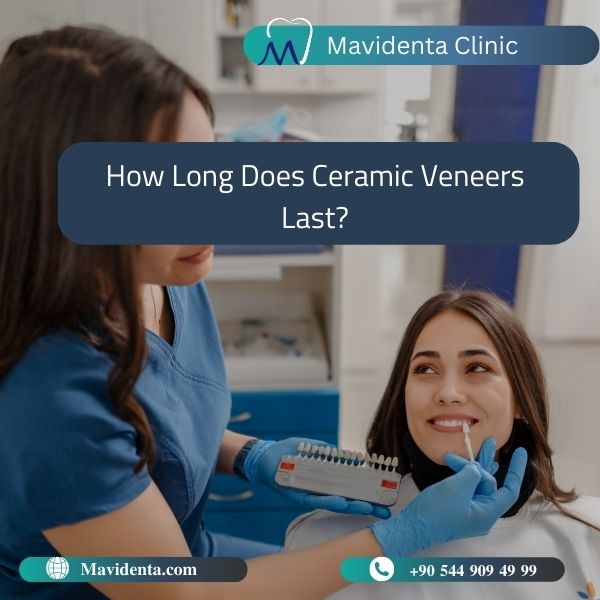Are you thinking about getting veneers to improve your smile but aren’t sure what materials to use? With so many alternatives on the market, determining which type of veneer is the best suit for your needs can be challenging. In this article, we will explore the difference between porcelain and ceramic veneers, so that you can make an informed decision about your dental treatment.
Difference between porcelain and ceramic veneers
Before we get to know the difference between porcelain and ceramic veneers. We have to look at some important information. Porcelain and ceramic are the materials that are most frequently used to create veneers. Either of these materials can be effectively used to enhance your smile by a skilled dentist like those at Mavidenta.
How can you choose which of the two is ideal for you when their qualities are similar? Some of each type’s benefits and drawbacks are listed below.
What are porcelain veneers?
Ceramic and composite resin veneers provide a variety of characteristics and advantages, but they fall short of porcelain in terms of longevity. Ceramics could be able to but in terms of durability, it’s comparable to porcelain, with ceramic possibly offering a little more customization than either porcelain or composite.
In any case, genuine porcelain veneers that are constructed entirely of porcelain must first be fitted to the teeth they are to cover to get the desired cosmetic result. And because we know that Mavidenta, the Most Trust Dental Clinic in Turkey, make it your first choice when you want to make porcelain veneers.
What are ceramic veneers?
Ceramic veneers require substantially less tooth preparation and are made to be more specifically tailored for a certain patient. They employ bacterial infection-resistant ceramic materials like zirconia that are bio-inert.
Like ceramic crowns, bridges, and implants, ceramic veneers are made of bio-inert, bacterial infection-resistant materials that are tooth-colored ceramics like zirconia. They are less likely to build up plaque and germs, and they won’t irritate your gums or the natural teeth next to them. They may also be synthetically altered to have any color, even a porcelain-like sheen.
Mavidenta High Quality Dental Clinic in Istanbul provides you with all the information about the difference between porcelain and ceramic veneers. Thus, doctors will rest the most suitable for your teeth.
Read more: Are Porcelain Crowns Strong? Explained!
Are veneers permanent?
Veneers are a common cosmetic dental technique used to improve a patient’s smile’s aesthetic faults. They are dental facades made of porcelain or composite that will make your smile appear brighter and more appealing.
As they are affixed to your teeth after a portion of your enamel is removed, veneers are a permanent surgery. The veneers themselves, however, only last for around 15 years before they need to be changed.
How are veneers fitted?

After we looked at the basic information about the difference between porcelain and ceramic veneers. Time to get into deeper detail.
The procedure for having veneers installed is easy and uncomplicated. It normally only requires a few sessions, but even once they are fitted, you will still need to go to your regular dental and hygienist appointments.
Planning
The procedure begins with the development of a treatment strategy. A member of our cosmetic team in Mavidenta will examine and take x-rays of your teeth first. This is done to make sure you don’t have any other hidden dental health problems and that veneers are the best course of therapy for you. Before we can proceed with installing your veneers, you might need to undergo additional procedures, or another procedure could be preferable given your desired outcome.
Our team is here to answer your questions and walk you through the many possible treatment choices. The possibilities for your replacement tooth will be discussed with you by your dentist after the treatment plan has been chosen. To give you a grin that seems natural, they will assist you in selecting a shape, size, and color that is as similar to your existing teeth as feasible. Because Mavidenta is the best and most affordable prices dental clinic in Istanbul.
Preparation
Once you are satisfied with the veneers you have selected, our staff will get your teeth ready for the procedure. A little bit of enamel is first removed from the tooth’s surface during the preparation stage. Only a layer with the same thickness as the veneer being replaced will be removed.
This keeps the thickness of your teeth where it was, preventing them from becoming too bulky and enhancing their natural appearance. Making a digital imprint of your teeth is the next stage. Your new veneers will then be meticulously crafted by our skilled experts.
Procedure
The actual fitting of your veneers is the last stage. We shall first clean, then roughen, and last polish, the tooth’s surface. This makes it possible for the bond between the veneer and the tooth to be stronger. Your tooth will next receive a specific adhesive before the veneer is affixed. The glue is then helped to set fast with the use of powerful light.
Before you depart, we evaluate your bite and make any necessary final adjustments to make sure you are satisfied with the way they look and feel. You can also get a guarantee certificate provided dental clinic in Istanbul.
Explore: Ceramic Vs Porcelain Crown Which Is Better To Perfect Smile
What are the concerns about porcelain veneers?
In light of the talk about the difference between porcelain and ceramic veneers and their problems, we have to realize that, largest barrier preventing consumers from selecting porcelain veneers is the increased price. But in the end, you’re paying for a product that lasts a lot longer and looks more natural. For information on how to pay for cosmetic dentistry, please see our page.
Even while porcelain veneers don’t need as much care and attention as composite ones do, you still need to adhere to the standard veneer maintenance guidelines to avoid bodily harm. In the uncommon event that one break or cracks, porcelain veneers may be taken off and replaced.
What is the difference between porcelain and ceramic veneers?
The main difference between porcelain and ceramic veneers is the type of material used. Porcelain veneers are made from a type of ceramic that is more durable, while ceramic veneers are thinner and lighter in weight. Porcelain veneers are also typically more expensive than ceramic veneers. Let’s explore more differences between porcelain and ceramic veneers
Porcelain veneers attributes
Let’s know what are the most distinctive characteristics of porcelain veneers:
A large variety of colors
Due to the few color options available for composite resin dental veneers, they frequently seem “too white” or powdery. You may select the ideal shade of white for porcelain veneers that exactly complements your skin tone, age, the color of your eyes, and even your gender!
Beauty and a natural appearance:
Translucency is the property of a veneer that allows light to pass through it. The veneers can reflect light like real teeth because of this important component. When determining translucency, your dentist will look at the color of the enamel on your existing teeth so that the veneer may be made to blend in with them.
Damage and stain resistance:
In addition to being a material with excellent strength, porcelain is practically stain-proof. They are particularly resistant to external stains like those from coffee. Your teeth will therefore continue to look fantastic for years to come following your surgery!
Toughness:
Ceramic or resin composite veneers cannot compare to the strength of porcelain, which is far superior. These porcelain veneers may last anywhere from 10 to 15 years, or even a lifetime if taken care of properly.
Ceramic veneers attributes
A few outstanding qualities of ceramic veneers are:
A long-term cosmetic fix:
To permanently alter and enhance the appearance of deformed, fractured, or chipped teeth, they are glued onto the front surfaces of the teeth. They could even be able to strengthen the tooth’s structural integrity if it is damaged or weak.
Fewer preparation hours
Because ceramic veneers are manufactured rather than machined, less time is required to prepare your natural teeth and shape them.
However, porcelain veneers need a lot of preparation and shaping, so you can frequently be given a temporary veneer while the final veneer is made.
Selecting a color:
You can decide on the final hue or color of the veneer. Your dentist will take into account your desire for whiter teeth and provide a proposal for a shade that is lighter than your natural teeth without seeming unnatural.
Very little tooth preparation:
Only a tiny bit of enamel must be removed to provide them room to be anchored to the teeth. The method used to prepare the teeth, the location of the teeth, and the technology used to obtain the findings can all have an impact on how they are prepared.
Our dentists at Mavidenta Dental guarantee that you will be blessed with amazing results, whether you choose porcelain or ceramic dental veneers.
Dental veneers can hide and correct issues with discolored, chipped, or malformed teeth, giving you the dream Hollywood smile you’ve always desired. Get dental veneers installed in Turkey right away!
Also check: Get Porcelain Veneers Without Shaving Teeth 2024
What are Better: Ceramic or Porcelain Veneers?
Both porcelain and ceramic veneers offer natural-looking results, but the decision of which is better depends on individual needs and preferences. Your dentist can help you decide which type of veneer is best suited for your particular dental issues.
Are Ceramic Veneers the Best?
Ceramic veneers are a popular choice for those seeking a minimally invasive dental treatment. They are thinner and lighter than porcelain veneers, which may be more comfortable for some patients. However, porcelain veneers are known for their durability and can last longer than ceramic veneers.
How Long Do Ceramic Veneers Last?

Ceramic veneers typically last between 5-10 years, depending on factors such as oral hygiene and daily wear and tear. Proper care and maintenance, including regular dental check-ups, can help extend the lifespan of your veneers.
What is the Best Type of Veneers?
The best type of veneer depends on your individual needs and dental issues. Your dentist will be able to provide a comprehensive consultation and recommend the best type of veneer for you.
Is the Procedure Painful?
The veneer fitting procedure is generally pain-free, as local anesthesia is used to numb the area. However, some patients may experience sensitivity or discomfort after the procedure, which can be managed with over-the-counter pain
In conclusion, At Mavidenta, our team of dental professionals is dedicated to helping you achieve your best smile. We offer a range of cosmetic dental treatments, including porcelain and ceramic veneers, to help correct dental issues and enhance your natural smile. Contact us today to schedule a consultation and learn more about how we can help you achieve your dental goals.
FAQ
Can veneers fix all dental issues?
A: Veneers are a cosmetic dental treatment and can help correct various dental issues, including discoloration, chips, and misalignments. However, they may not be suitable for more severe dental problems, such as tooth decay or gum disease.
How do I take care of my veneers?
Veneers require regular oral hygiene practices, such as brushing and flossing twice a day. Avoid biting hard objects or using your teeth to open packages, as this can damage the veneers. Additionally, regular dental check-ups and cleanings are essential to maintaining the lifespan of your veneers.
Are veneers noticeable?
Veneers are designed to mimic the natural appearance of teeth and are custom-made to match your natural tooth color. When fitted correctly, they should not be noticeable and will blend seamlessly with your natural teeth.
Can veneers be removed?
Veneers are a permanent dental treatment and require the removal of a small amount of tooth enamel to fit correctly. However, they can be replaced or removed if necessary, but this may require additional dental work.






